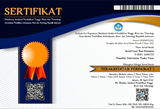Evaluasi Dua Metode Pengukuran Pertumbuhan Karang Bercabang Pocillopora verrucosa
Abstract
Karang bercabang Pocillopora verrucosa merupakan salah satu organisme karang yang memiliki peran penting dalam ekosistem terumbu karang. Penelitian ini menilai dan mengevaluasi pertumbuhan luas permukaan (2D) dan pertumbahan secara linear (1D) untuk species P. verrucosa. Kami menggunakan lima fragment dengan ukuran 6-8 cm yang ditempatkan di media yang telah disediakan. Kami menggunakan rankangain media besi untuk mengikatkan fragmen dengan menggunakan cables ties. Seluruh fragmen difoto secara horizontal dengan jarak tetap dengan kamera underwater secara vertikal. Pemantauan dilakukan melalui fotografi pada saat pengikatan karang dan selang dua bulan setelah ditransplan. Kami menggunakan software imageJ untuk mengukur luas bidang dan perubahan linier setiap foto. Analisis ANOVA digunakan untuk mengetahui laju pertumbuhan fragmen karang berdasarkan metode pengukurannya. Hasil penelitian menunjukkan bahwa luas permukaan (2D) P. verrucosa menunjukkan nilai koefisien varian yang berbeda nyata (p<0.05) dengan pengukuran pertumbuhan secara linear (1D).
Keywords
Full Text:
PDFReferences
Bak, R. P. M., & Meesters, E. H. (1998). Coral population structure: The hidden information of colony size-frequency distributions. Marine Ecology Progress Series, 162(February 1998), 301–306. https://doi.org/10.3354/meps162301
Barott, K., Smith, J., Dinsdale, E., Hatay, M., Sandin, S., & Rohwer, F. (2009). Hyperspectral and Physiological Analyses of Coral-Algal Interactions. PLoS ONE, 4(11). https://doi.org/10.1371/journal.pone.0008043
Bellwood, D. R., Hughes, T. P., Folke, C., & Nyström, M. (2004). Confronting the coral reef crisis. Nature, 429(6994), 827–833. https://doi.org/10.1038/nature02691
Buddemeier, R. W., & Kinzie, R. A. (1976). Coral growth. Oceanogr. Mar. Biol. Ann. Rev., 759, 32–43. https://doi.org/10.4324/9781315265353-4
Cohen, A. L., & Holcomb, M. (2009). Why corals care about ocean acidification uncovering the mechanism. Oceanography, 22(SPL.ISS. 4), 118–127. https://doi.org/10.5670/oceanog.2009.102
Edmunds, P. J., & Elahi, R. (2007). The demographics of a 15-year decline in cover of the Caribbean reef coral Montastraea annularis. Ecological Monographs, 77(1), 3–18. https://doi.org/10.1890/05-1081
Fabricius, K., & Alderslade, P. (2001). Soft corals and sea fans : a comprehensive guide to the tropical shallow water genera of the central-west Pacific, the Indian Ocean and the Red Sea. Australian Institute of Marine Science, 264.
Hellström, M., & Benzie, J. A. H. (2011). Robustness of size measurement in soft corals. Coral Reefs, 30(3), 787–790. https://doi.org/10.1007/s00338-011-0760-4
Hoegh-Guldberg, O., Muller-Parker, G., Cook, C. B., Gates, R. D., Gladfelter, E., Trench, R. K., & Weis, V. M. (2007). Len Muscatine (1932-2007) and his contributions to the understanding of algal-invertebrate endosymbiosis. Coral Reefs, 26(4), 731–739. https://doi.org/10.1007/s00338-007-0320-0
Kikuzawa, Y. P., Toh, T. C., Ng, C. S. L., Sam, S. Q., Taira, D., Afiq-Rosli, L., & Chou, L. M. (2018). Quantifying growth in maricultured corals using photogrammetry. Aquaculture Research, 49(4), 2249–2255. https://doi.org/10.1111/are.13683
Knowlton, N., & Jackson, J. B. C. (2008). Shifting baselines, local impacts, and global change on coral reefs. PLoS Biology, 6(2), 0215–0220. https://doi.org/10.1371/journal.pbio.0060054
Munandar, M., Chiu, Y. C., Chou, C. C., Rahmayanti, F., Faiqoh, E., & Liu, S. Y. V. (2023). Evaluating the feasibility of measuring planar area of Sclerophytum penghuense and Cladiella hartogi using 2D image analysis. Bulletin of Marine Science, 94(0).
Pandolfi, J. M., Bradbury, R. H., Sala, E., Hughes, T. P., Bjorndal, K. A., Cooke, R. G., McArdle, D., McClenachan, L., Newman, M. J. H., Paredes, G., Warner, R. R., & Jackson, J. B. C. (2003). Global trajectories of the long-term decline of coral reef ecosystems. Science, 301(5635), 955–958. https://doi.org/10.1126/science.1085706
Samidon, M., Razi, N. M., Agustiar, M., Harahap, P. B., Najmi, N., Bahri, S., & Liu, S. Y. V. (2022). In-situ electro-stimulation enhanced branching but not massive scleractinian coral growth. Frontiers in Marine Science, 9(September), 1–13. https://doi.org/10.3389/fmars.2022.917360
Wilkinson, C. (2008). Status of coral reefs of the world: 2008. Global Coral Reef Monitoring Network and Reef and Rainforest Research Centre, Townsville, Australia, 296 p.
DOI: https://doi.org/10.35308/jlik.v5i2.8647
Refbacks
- There are currently no refbacks.
Copyright (c) 2023 Munandar Munandar, Fitria Rahmayanti, Rudi Hermi, Heriansyah Heriansyah, Syahrul Ramadhan
e-ISSN: 2684-7051| DOI:
10.35308
Jl. Alue Peunyareng, Ujong Tanoh Darat, Meureubo, Kabupaten Aceh Barat, Aceh 23681, Indonesia
(0655) 7110535 | +62 822-6886-3033

This work is licensed under a Creative Commons Attribution-ShareAlike 4.0 International License.













